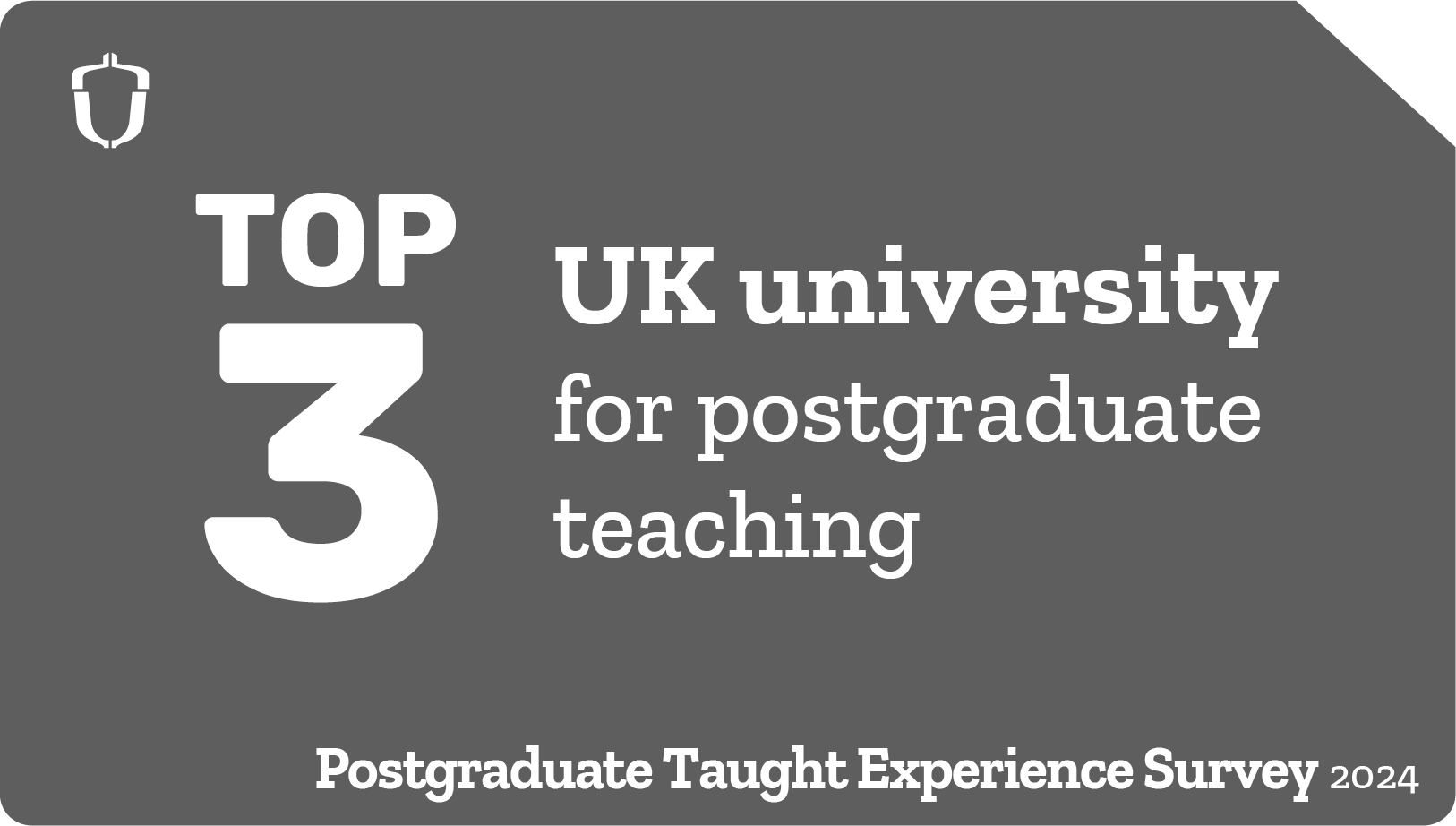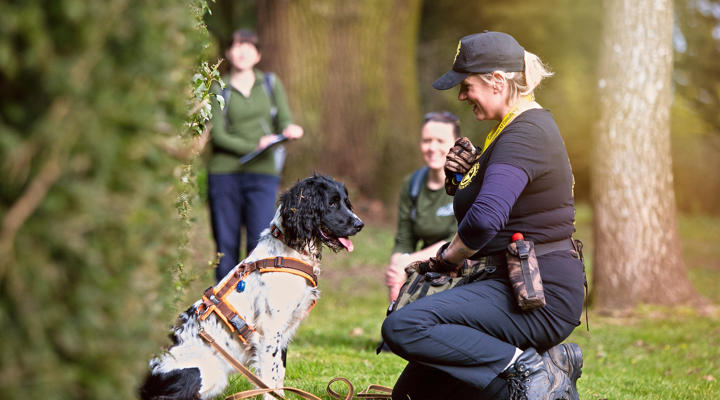Course information
Progress your way
The course is designed to allow specialisation in one of four defined pathways up to Postgraduate Certificate level, before moving into the MSc programme, with the aim of developing and conducting a piece of research in a specialist area of practice. Our award titles have been developed to include a range of specialist areas, drawing upon the expertise of our industry-active academics and encompassing contributions from guest lecturers and researchers.
Our range of veterinary nursing Postgraduate Certificates available to students includes two equine and two generic (equine and small animal) options.
Please click the links below to find out more about these individual pathways.
- Advanced Veterinary Nursing (Clinical Nursing and Client Support)
- Advanced Veterinary Nursing (Perioperative Nursing and Patient Safety)
- Advanced Equine Veterinary Nursing (Critical Care)
- Advanced Equine Veterinary Nursing (Diagnostic Imaging and Rehabilitation)
Flexible learning
All compulsory delivery is flexible and online, with optional study days at weekends providing opportunities to access our world-class facilities and meet with fellow students and staff face-to-face. The course can be tailored to fit around your existing commitments, with options to complete in three to seven years.
Students completing any of these pathways are are eligible to achieve the Royal College of Veterinary Surgeons’ (RCVS) Certificate in Advanced Veterinary Nursing once all requirements for the Postgraduate Certificate have been achieved (applicants from outside the United Kingdom will be required to check their eligibility for this award). This requires enrolment directly with RCVS at the start of the course; see ’Fees and Funding’ for more.
A typical offer for our MSc Advanced Veterinary Nursing course is a BSc in Veterinary Nursing or a Level 3 Diploma in Veterinary Nursing.
Applicants must be a Royal College of Veterinary Surgeons, Registered Veterinary Nurse or Registered Equine Veterinary Nurse.
International students
We welcome applications from international students and accept international qualifications at equivalent levels to the above.
You may also need to evidence proficiency in English language.
Only applicants who are RCVS Registered Veterinary Nurses are eligible to gain the RCVS Certificate in Advanced Veterinary Nursing
Please contact us for further information.
A supportive community
Hartpury offers students opportunities to join a flourishing postgraduate research community, attend regular research meetings held both on-site and online and present research at events.
You’ll benefit from the expertise of our professional veterinary nursing team, whose research interests include veterinary professional ethics and law, equine intensive care, behaviour and rehabilitation, and end-of-life care for animal patients. At Hartpury University, you’ll join an inclusive, supportive and welcoming learning community that will help you to develop as an advanced practitioner.
Guest lecturers
Industry professionals form an important part of your learning, enabling you to gain insights into current approaches to practice. You'll hear from guest lecturers on this programme, from a range of veterinary practice types and with a wealth of specialist knowledge. We have links with many experts in their fields, and because of the online delivery, we can involve experts from outside the UK too.
We're committed to supporting you to fulfil your unique potential while you're here so that you can achieve your personal and professional goals.
Your support network
You'll benefit from a strong support network from day one. This will range from your lecturers and your personal tutor to our specialist academic (Achievement and Success Centre), employability (Innovation, Careers and Enterprise) and wellbeing teams.
Duration
Part-time: this Pathway has been designed to take three years to complete
However, options can be tailored to suit your needs, enabling you to complete your qualification within the maximum study times, which are as follows:
- Postgraduate Certificate: One to three years
- MSc: Three to seven years
Course information
Overview
Progress your way
The course is designed to allow specialisation in one of four defined pathways up to Postgraduate Certificate level, before moving into the MSc programme, with the aim of developing and conducting a piece of research in a specialist area of practice. Our award titles have been developed to include a range of specialist areas, drawing upon the expertise of our industry-active academics and encompassing contributions from guest lecturers and researchers.
Our range of veterinary nursing Postgraduate Certificates available to students includes two equine and two generic (equine and small animal) options.
Please click the links below to find out more about these individual pathways.
- Advanced Veterinary Nursing (Clinical Nursing and Client Support)
- Advanced Veterinary Nursing (Perioperative Nursing and Patient Safety)
- Advanced Equine Veterinary Nursing (Critical Care)
- Advanced Equine Veterinary Nursing (Diagnostic Imaging and Rehabilitation)
Flexible learning
All compulsory delivery is flexible and online, with optional study days at weekends providing opportunities to access our world-class facilities and meet with fellow students and staff face-to-face. The course can be tailored to fit around your existing commitments, with options to complete in three to seven years.
Students completing any of these pathways are are eligible to achieve the Royal College of Veterinary Surgeons’ (RCVS) Certificate in Advanced Veterinary Nursing once all requirements for the Postgraduate Certificate have been achieved (applicants from outside the United Kingdom will be required to check their eligibility for this award). This requires enrolment directly with RCVS at the start of the course; see ’Fees and Funding’ for more.
Entry requirements
A typical offer for our MSc Advanced Veterinary Nursing course is a BSc in Veterinary Nursing or a Level 3 Diploma in Veterinary Nursing.
Applicants must be a Royal College of Veterinary Surgeons, Registered Veterinary Nurse or Registered Equine Veterinary Nurse.
International students
We welcome applications from international students and accept international qualifications at equivalent levels to the above.
You may also need to evidence proficiency in English language.
Only applicants who are RCVS Registered Veterinary Nurses are eligible to gain the RCVS Certificate in Advanced Veterinary Nursing
Please contact us for further information.
Employability
A supportive community
Hartpury offers students opportunities to join a flourishing postgraduate research community, attend regular research meetings held both on-site and online and present research at events.
You’ll benefit from the expertise of our professional veterinary nursing team, whose research interests include veterinary professional ethics and law, equine intensive care, behaviour and rehabilitation, and end-of-life care for animal patients. At Hartpury University, you’ll join an inclusive, supportive and welcoming learning community that will help you to develop as an advanced practitioner.
Guest lecturers
Industry professionals form an important part of your learning, enabling you to gain insights into current approaches to practice. You'll hear from guest lecturers on this programme, from a range of veterinary practice types and with a wealth of specialist knowledge. We have links with many experts in their fields, and because of the online delivery, we can involve experts from outside the UK too.
How you'll study
We're committed to supporting you to fulfil your unique potential while you're here so that you can achieve your personal and professional goals.
Your support network
You'll benefit from a strong support network from day one. This will range from your lecturers and your personal tutor to our specialist academic (Achievement and Success Centre), employability (Innovation, Careers and Enterprise) and wellbeing teams.
Duration
Part-time: this Pathway has been designed to take three years to complete
However, options can be tailored to suit your needs, enabling you to complete your qualification within the maximum study times, which are as follows:
- Postgraduate Certificate: One to three years
- MSc: Three to seven years
Qualification and modules
You'll develop your skills as an advanced veterinary nursing practitioner in your chosen area of specialisation. You’ll learn how to utilise the latest research and cutting-edge industry knowledge to evaluate your current practice, introduce new protocols and work with your team and your clients to maximise the welfare of patients in your care. You will develop an area of research that will advance knowledge in your chosen area of practice. You'll have the opportunity to develop skills in communicating your research findings to other members of your practice team and to wider, non-specialist audiences.
An important part of these qualifications is working with your fellow learners to share experiences, problems, and solutions. Your learning community, although online, will use peer discussions to maximise collaborative learning. Assessment strategies will relate strongly to the practice context, enabling you to use your prior knowledge and experience, together with new learning, to produce work that is applied and relevant to your situation.
You'll be invited to join our veterinary-specific ‘community of practice’ which aims to share knowledge with and between practices and to consult veterinary professionals regarding areas for future research.
Successful completion of your modules will enable you to gain a Postgraduate Certificate award (pass, merit or distinction) after completion of 60 credits, or the full MSc award (pass, merit or distinction) after completion of 180 credits.
Core modules: Year one
Advanced Veterinary Nurse Practitioner (15 credits)
This module will develop your professional ethical knowledge as well as your ability to reflect and evaluate your own practice to support your role as a clinic-based, community or referral advanced nurse practitioner in either equine or small animal practice.
Applied Research in Veterinary Practice (15 credits)
This module will provide you with the necessary skills and resources to evaluate current literature in your chosen discipline, to formulate research questions and answer them, and to work with a variety of research methods and statistical approaches.
Core specialist modules: Postgraduate Certificate
Postgraduate Certificate in Advanced Equine Veterinary Nursing (Diagnostic Imaging and Rehabilitation)
Equine Veterinary Diagnostics (15 credits)
This module will involve evaluation and comparison of currently used methods of diagnostic imaging, together with approaches to management of these diagnostic methods, patient positioning for a variety of conditions, and effective liaison with clients.
Rehabilitation of the Equine Veterinary Patient (15 credits)
Looking at factors that may influence rehabilitation post-injury or disease, together with techniques such as physiotherapy in returning the equine patient to full fitness, this module will prepare you to plan and evaluate rehabilitation programmes for individual patients.
Postgraduate Certificate in Advanced Equine Veterinary Nursing (Critical Care)
Equine Anaesthesia and Analgesia (15 credits)
As well as evaluating current techniques for anaesthesia in a variety of equine patients, and the role of the advanced veterinary nursing practitioner in preparing for and monitoring these patients, you will consider the latest developments in pain management for equine patients.
Equine Intensive Care Nursing (15 credits)
This module will provide the opportunity to review and evaluate equine intensive care techniques in the clinic, including care for emergencies; it will also prepare you to offer intensive care to patients in the community, through effective liaison with clients.
Postgraduate Certificate in Advanced Veterinary Nursing (Clinical Nursing and Client Support)
Clinical Nursing of Patients with Long-Term Conditions (15 credits)
In this module, you will evaluate the role of the advanced veterinary nursing practitioner in supporting patients with long-term medical conditions, in terms of planning, monitoring and evaluating ongoing care, and including the roles of other members of the team.
Communication and Client Support in Veterinary Practice (15 credits)
The fundamental role of communication, with other team members and with clients, will be explored in this module. Topics will include the provision of nurse clinics, specific communication techniques, and support for clients during end-of-life care.
Postgraduate Certificate in Advanced Veterinary Nursing (Perioperative Nursing and Patient Safety)
Perioperative Surgical Nursing Care (15 credits)
The role of the advanced veterinary nursing practitioner in providing optimal care to surgical patients before, during and after surgery will be explored using evidence from current research. Topics will include patient monitoring during anaesthesia and recovery, and liaison with clients during patient admission and discharge.
Clinical Audit and Patient Safety in Veterinary Practice (15 credits)
This module will consider factors influencing patient safety, including human factors and the role of team communication. It will highlight the important role of clinical audit in evaluating and improving patient safety in practice.
Core modules: Year two
Applied Research Practice (30 credits)
Students will gain experience of exploring literature, understanding and utilising research methodologies, and data analysis aligned to their specific area of interest. This process will lead to the design, completion and write-up of a preliminary research project where dissemination of research outputs will also be covered to develop scientific communications skills.
Optional modules: Year two
Any TWO of the specialist modules on any of the Postgraduate Certificate pathways that you have not previously studied (30 credits).
Core module: Year three
Postgraduate Dissertation (60 credits)
Students will develop and implement a research project with the support of an individual supervisor to guide and support them to undertake this innovative piece of research.
Qualification and modules
What you'll study
You'll develop your skills as an advanced veterinary nursing practitioner in your chosen area of specialisation. You’ll learn how to utilise the latest research and cutting-edge industry knowledge to evaluate your current practice, introduce new protocols and work with your team and your clients to maximise the welfare of patients in your care. You will develop an area of research that will advance knowledge in your chosen area of practice. You'll have the opportunity to develop skills in communicating your research findings to other members of your practice team and to wider, non-specialist audiences.
An important part of these qualifications is working with your fellow learners to share experiences, problems, and solutions. Your learning community, although online, will use peer discussions to maximise collaborative learning. Assessment strategies will relate strongly to the practice context, enabling you to use your prior knowledge and experience, together with new learning, to produce work that is applied and relevant to your situation.
You'll be invited to join our veterinary-specific ‘community of practice’ which aims to share knowledge with and between practices and to consult veterinary professionals regarding areas for future research.
Module credits
Successful completion of your modules will enable you to gain a Postgraduate Certificate award (pass, merit or distinction) after completion of 60 credits, or the full MSc award (pass, merit or distinction) after completion of 180 credits.
Modules
Core modules: Year one
Advanced Veterinary Nurse Practitioner (15 credits)
This module will develop your professional ethical knowledge as well as your ability to reflect and evaluate your own practice to support your role as a clinic-based, community or referral advanced nurse practitioner in either equine or small animal practice.
Applied Research in Veterinary Practice (15 credits)
This module will provide you with the necessary skills and resources to evaluate current literature in your chosen discipline, to formulate research questions and answer them, and to work with a variety of research methods and statistical approaches.
Core specialist modules: Postgraduate Certificate
Postgraduate Certificate in Advanced Equine Veterinary Nursing (Diagnostic Imaging and Rehabilitation)
Equine Veterinary Diagnostics (15 credits)
This module will involve evaluation and comparison of currently used methods of diagnostic imaging, together with approaches to management of these diagnostic methods, patient positioning for a variety of conditions, and effective liaison with clients.
Rehabilitation of the Equine Veterinary Patient (15 credits)
Looking at factors that may influence rehabilitation post-injury or disease, together with techniques such as physiotherapy in returning the equine patient to full fitness, this module will prepare you to plan and evaluate rehabilitation programmes for individual patients.
Postgraduate Certificate in Advanced Equine Veterinary Nursing (Critical Care)
Equine Anaesthesia and Analgesia (15 credits)
As well as evaluating current techniques for anaesthesia in a variety of equine patients, and the role of the advanced veterinary nursing practitioner in preparing for and monitoring these patients, you will consider the latest developments in pain management for equine patients.
Equine Intensive Care Nursing (15 credits)
This module will provide the opportunity to review and evaluate equine intensive care techniques in the clinic, including care for emergencies; it will also prepare you to offer intensive care to patients in the community, through effective liaison with clients.
Postgraduate Certificate in Advanced Veterinary Nursing (Clinical Nursing and Client Support)
Clinical Nursing of Patients with Long-Term Conditions (15 credits)
In this module, you will evaluate the role of the advanced veterinary nursing practitioner in supporting patients with long-term medical conditions, in terms of planning, monitoring and evaluating ongoing care, and including the roles of other members of the team.
Communication and Client Support in Veterinary Practice (15 credits)
The fundamental role of communication, with other team members and with clients, will be explored in this module. Topics will include the provision of nurse clinics, specific communication techniques, and support for clients during end-of-life care.
Postgraduate Certificate in Advanced Veterinary Nursing (Perioperative Nursing and Patient Safety)
Perioperative Surgical Nursing Care (15 credits)
The role of the advanced veterinary nursing practitioner in providing optimal care to surgical patients before, during and after surgery will be explored using evidence from current research. Topics will include patient monitoring during anaesthesia and recovery, and liaison with clients during patient admission and discharge.
Clinical Audit and Patient Safety in Veterinary Practice (15 credits)
This module will consider factors influencing patient safety, including human factors and the role of team communication. It will highlight the important role of clinical audit in evaluating and improving patient safety in practice.
Core modules: Year two
Applied Research Practice (30 credits)
Students will gain experience of exploring literature, understanding and utilising research methodologies, and data analysis aligned to their specific area of interest. This process will lead to the design, completion and write-up of a preliminary research project where dissemination of research outputs will also be covered to develop scientific communications skills.
Optional modules: Year two
Any TWO of the specialist modules on any of the Postgraduate Certificate pathways that you have not previously studied (30 credits).
Core module: Year three
Postgraduate Dissertation (60 credits)
Students will develop and implement a research project with the support of an individual supervisor to guide and support them to undertake this innovative piece of research.
The programme is designed to be delivered entirely online. Modules contain a mixture of flexible learning resources including online lectures. Workshops and discussion sessions are designed to be delivered live.
The course is taught in English.
| Contact learning | Independent learning | |
| MSc degree | 10% | 90% |
| Postgraduate Certificate | 16% | 84% |
Teaching contact time and method will vary depending on the module you’re studying. You’ll be expected to dedicate at least two to three hours of independent study per week for each module, in addition to approximately 2 hours of contact time.
You’ll be assessed through a combination of written tests, oral assessments and written assignments. Most modules will include a mixture of assessment types. Feedback will be provided in written form, with the option for follow-up discussions with academic staff.
| Written exam | Practical exam | Coursework | |
| MSc degree | 10% | 39% | 51% |
| Postgraduate Certificate | 15% | 33% | 52% |
This course is made up of two semesters starting in September. Semesters normally consist of 12 weeks of scheduled teaching and then assessment weeks, with an overview below:
- Scheduled online workshops generally take place in the evenings (after 6pm), for most modules this will be every week
- Most workshops will require 1-2 hours of preparatory reading
- Teaching timetables will be made available before enrolment.
Please visit our student finance page for information on tuition fees and student loans, as well as non-repayable grants, bursaries and scholarships, eligible to different groups, to support with study costs.
RCVS Certificate in Advanced Veterinary Nursing
There will be an additional fee if you wish to enrol for the RCVS Certificate in Advanced Veterinary Nursing. Find out more.
Our Resource Library is where you'll find all the essential details about Hartpury University's courses. It includes Programme and Module Specifications, along with Course Information Sheets for every course. You can easily download a complete revision history for each of these, clearly showing the dates changes were made.
Course Information Sheets: These are PDF versions of the course webpages. They provide an overview of the course, what to expect during your studies, and the topics covered.
Programme Specifications: These are detailed, validated documents containing academic specifics for each programme. They include descriptions of the programme, its aims, learning outcomes, year and module structure, as well as teaching, learning, and assessment strategies.
Module Specifications: Each Programme consists of several Modules. Our Module Specifications outline the topics covered and the expected outcomes for students studying each Module.
It's a good idea to think about fees and funding around your course as early as you can. We can help you to understand and take control of your finances. Here’s everything you need to know at a glance.

Our specialist facilities match our specialist nature. Students benefit from access to some of the most advanced facilities in the world at an educational institution.


RCVS-accredited
Our Postgraduate Certificate courses are accredited by the Royal College of Veterinary Surgeons (RCVS). On graduation, you’ll be eligible to join the RCVS Register of Veterinary Nurses and practise as a Registered Veterinary Nurse.

Top 3 UK University
We're a top 3 UK university for postgraduate teaching, and top 5 UK university for overall postgraduate satisfaction (PTES 2024).

World leading
Our research has been recognised as 'world-leading' and 'internationally excellent' (Research Excellence Framework 2021).
Get in touch
Important information
Every effort has been made to ensure the accuracy of our published course information, however our programmes are reviewed and developed regularly. Changes or cancellation of courses may be necessary to ensure alignment with emerging employment areas, to comply with accrediting body requirements, revisions to subject benchmark statements or as a result of student feedback. We reserve the right to make necessary changes and will notify all offer-holders of changes as and when they occur.











